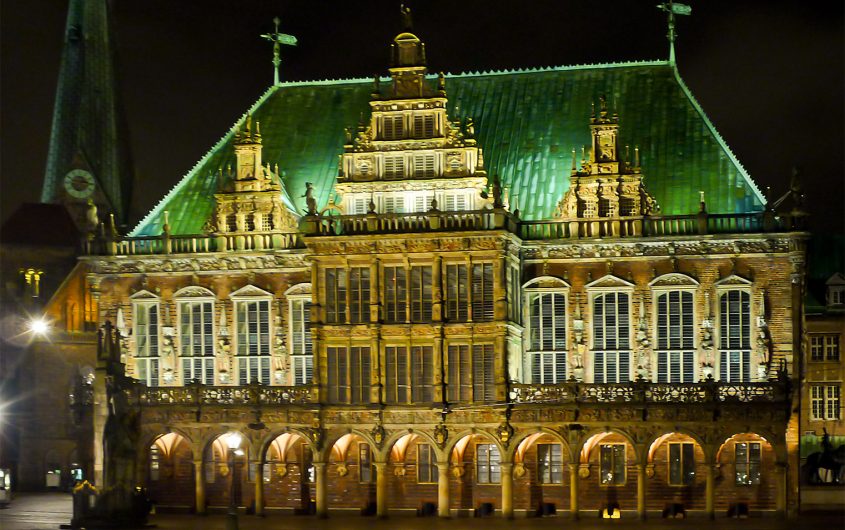
Pedelecs via Wikimedia Commons
The 2019 State Elections in Bremen: A Mini-State of the Federal Republic of Germany with Maximum Political Impact on Germany’s Political Future

Dieter Dettke
Georgetown University
Dr. Dieter Dettke is a Non-Resident Fellow at AICGS and Adjunct Professor at Georgetown University.
Dr. Dettke served as the U.S. Representative and Executive Director of the Friedrich Ebert Foundation in Washington from 1985 until 2006 managing a comprehensive program of transatlantic cooperation. In 2006, he joined the German Marshall Fund of the United States as a Transatlantic Fellow and from September 2006 to June 2007, he was a Fellow at the Woodrow Wilson International Center for Scholars. His most recent book is “Germany Says ‘No’: The Iraq War and the Future of German Foreign and Security Policy,” published by theWoodrow Wilson Center Press and The Johns Hopkins University Press, Washington, DC, and Baltimore, 2009.
Dr. Dettke is a foreign and security policy specialist, author and editor of numerous publications on German, European, and U.S. foreign and security issues.
He studied Law and Political Science in Bonn and Berlin, Germany, and Strasbourg, France and was a Fulbright Scholar at the University of Washington in Seattle in 1967/68.
Bremen, with its 482,000 citizens, is the smallest state of the Federal Republic of Germany. Governed by the Social Democratic Party (SPD) as the strongest political force since 1946, last Sunday’s election results put an end to an unparalleled Social Democratic success story. Preliminary results show the SPD losing some 9 percent of the votes compared to the last elections in Bremen and ending up with just 23.6 percent, meaning the SPD is now in second place behind the CDU and its 25.5 percent. A continuation of the current Red-Green government coalition appears to be impossible as the two parties would not have enough votes for a majority in parliament, the Bürgerschaft of the Free and Hanseatic City of Bremen. Now as the strongest political party in the city-state, the CDU will certainly try to replace the SPD in government. This will only be possible in a so-called Jamaica Coalition of the CDU (25.5%), the Greens (17.6%), and the FDP (5.9%) in order to secure a majority of 43 seats in the Bürgerschaft.
Last Sunday’s election results put an end to an unparalleled Social Democratic success story.
Other coalition models are possible, most importantly a so-called Red-Red-Green Coalition of the SPD (23.6%), the Greens (17.6%), and Die Linke (10.1%). Theoretically possible, but very unlikely in reality, would be a so-called Traffic Light Coalition of the SPD (red), the Greens (green), and the FDP (yellow). With possibly 46 seats in the Bürgerschaft, such a coalition would be able to cobble together a majority, but fraught with so many unbridgeable political differences that it is not a viable option.
A possible Grand Coalition of CDU and SPD was excluded by the SPD before the elections and can hardly be reopened since the SPD would then end up as the junior partner in such a coalition.
In any possible scenario, the Greens are now the kingmaker in Bremen.
In any possible scenario, the Greens are now the kingmaker in Bremen. No government can be formed without the Greens, and they will also have the final say with regard to the fate of the Social Democrats either in government or in opposition as well as with regard to a future government under CDU leadership. As kingmaker, the Greens will consider the two most likely coalition options—Jamaica and Red-Red-Green—very carefully. One consideration is the responsibility to recognize the fact that the CDU, as the strongest party, gained the right to try to form a government with a coalition of its choice, and the CDU will certainly try to invite the Greens to form a coalition together with the FDP. Government experience is key for the future of the Green Party and the desire to shape government policies in a coalition with the CDU will most likely outweigh the closer ideological ties with the SPD. In the neighboring city-state of Hamburg, a SPD-Green Coalition is in power whereas in adjacent Lower Saxony, a Grand Coalition of SPD and CDU forms the government. But precisely because the Green Party will try to keep options open for a role in government both on the state and national level, one has to expect a CDU/Green/FDP government to emerge from the elections in Bremen.
For the FDP, a coalition partnership with the CDU and the Greens is also the most likely and most attractive coalition model for its membership as well as for its clientele. An earlier attempt to form a Jamaica Coalition on the federal level failed largely because of concerns of appearing too accommodating vis-à-vis a dominant CDU/CSU in such a coalition. However, the refusal to join a national Jamaica experiment in 2017 did not go over well with the German public. The FDP learned from this strategic mistake and now has an opportunity to make the Jamaica option a successful experiment in Bremen.
The FDP learned from this strategic mistake and now has an opportunity to make the Jamaica option a successful experiment in Bremen.
This outcome of the elections in Bremen is yet another bitter experience for the SPD. Once a Jamaica Coalition model of the CDU, the Greens, and the FDP is established successfully, Social Democrats could end up in opposition for a long time to come. Therefore, the electoral results of the small state of Bremen will have outsized repercussions on the national level. The most obvious consequence for the SPD will be a further erosion of the legitimacy of the Grand Coalition of SPD and CDU/CSU on the national level. For some time already, SPD voters as well as rank and file members have expressed deep dissatisfaction with the results of the Grand Coalition, holding SPD policy positions as a partner of the CDU/CSU in government responsible for the series of electoral defeats of the past. The SPD is basically split into two camps, one more fundamental left wing of the party pushing against continuity in government and seeking renewal in opposition and the other trying to stay the course as a governing partner of the CDU/CSU.
The elections in Bremen could well lead not only to the end of the Grand Coalition in Berlin, but also to new national elections in Germany and another change of SPD leadership. Taking into account the SPD’s performance in the European elections (which took place on the same day as the state elections in Bremen), the leadership question becomes even more pressing. As the downward trend of election results continues inexorably on the local, national, and European levels, some form of intervention either on the party leadership level or on the level of the coalition model in Berlin—or both—will become inevitable. In the European elections, the SPD lost another 11.5 percent of the votes compared with the last European elections. With only 15.6 percent of the votes now, the SPD scored even lower than the Green Party (21.6%). What a bitter experience for Germany’s oldest and uninterruptedly democratic political party to fall from the heights of 73 years of dominance in Bremen to a possible future of long years of opposition.
What a bitter experience for Germany’s oldest and uninterruptedly democratic political party to fall from the heights of 73 years of dominance in Bremen to a possible future of long years of opposition.
Having excluded any possibility of forging a two-party Grand Coalition of CDU and SPD in Bremen and betting everything on a Red-Red-Green coalition, the SPD will have to prepare for a future without a realistic power perspective for years to come. Aggravating the situation for Social Democrats is its long history as a party in power. The SPD will also be held accountable for structural deficits the city has accumulated over the years. Although a successful research and industrial location as a result of a still flourishing transportation and space industry, Bremen’s debt burden is higher than in any other state of the Federal Republic of Germany. Today, investment in education and other public services is falling behind. The city is in need of major reforms and the financial resources are under severe stress. A once faithful working class voter base is no longer as committed as in the past. The SPD will have to face the uncertain future of trying to become a political force again in a much more complex social, economic, political, and cultural environment than ever before.








